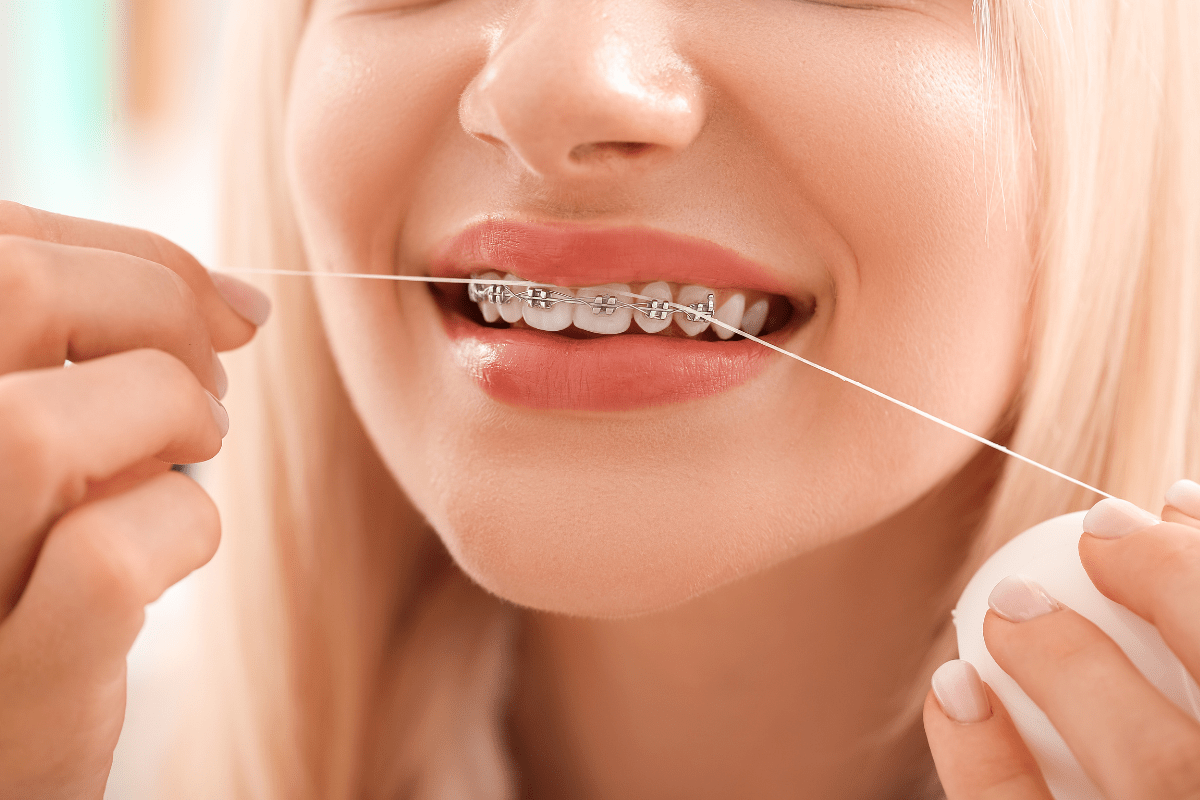Taking care of your teeth is always important, but it becomes even more crucial when you’re undergoing orthodontic treatment. Braces can make oral hygiene routines like flossing a bit more challenging, but fear not! With the right techniques and tools, you can keep your teeth and gums healthy throughout your treatment journey. In this article, we’ll dive into the ins and outs of flossing with braces. From understanding the challenges to mastering the techniques, we’ve got you covered. So, let’s get started on the path to a healthy, beautiful smile!
Challenges of Flossing with Braces
Flossing with braces presents unique challenges due to the presence of wires and brackets that can trap food particles and plaque. Traditional flossing methods may not be as effective or easy to maneuver around these orthodontic appliances. As a result, individuals wearing braces may find it difficult to maintain optimal oral hygiene and prevent issues like tooth decay and gum disease. Understanding these challenges is the first step toward finding effective solutions for flossing with braces.
Techniques for Flossing with Braces
Use Orthodontic Floss Threaders: Orthodontic floss threaders are specially designed tools that make it easier to thread floss underneath wires and between brackets. By using these threaders, individuals can navigate around braces more effectively, ensuring that they reach all areas between teeth and along the gumline.
- Interdental Brushes: Interdental brushes are small, cone-shaped brushes that can fit between brackets and wires to clean hard-to-reach areas. These brushes can be particularly useful for removing food particles and plaque from around brackets and underneath wires where floss may not reach easily.
- Water Flossers: Water flossers, also known as oral irrigators, use a stream of water to clean between teeth and along the gumline. This can be an effective alternative to traditional flossing, especially for individuals with braces. Water flossers can flush out debris from around brackets and wires, promoting better oral hygiene.
- Superfloss or Dental Tape: Superfloss or dental tape is a type of floss that combines a stiff end, regular floss, and a spongy component. This design allows individuals to easily thread the floss underneath wires and between brackets. Superfloss can be particularly helpful for individuals with braces, as it provides a more thorough cleaning than traditional floss.
- Flossing Tools: Several flossing tools and aids are available specifically for individuals with braces. These tools may include floss threaders, interdental brushes, or floss picks designed for use with braces. Exploring different flossing tools can help individuals find the most comfortable and effective option for their specific needs.
By incorporating these techniques into their daily oral hygiene routine, individuals with braces can overcome the challenges of flossing and maintain optimal oral health throughout their orthodontic treatment.
5 Tips for Successful Flossing
Establish a Routine: Consistency is key when it comes to flossing with braces. Make it a habit to floss at least once a day, preferably before bedtime, to remove plaque and food particles that have accumulated throughout the day.
- Be Patient and Gentle: Flossing with braces may take longer than usual, so be patient and take your time. Use gentle, controlled movements to avoid damaging the wires or brackets. If you encounter resistance, try adjusting the angle of the floss or using a different technique.
- Use the Right Amount of Floss: Cut a piece of floss that is long enough to comfortably navigate around your braces. Typically, a piece of floss between 18 and 24 inches long should suffice. Avoid using too much force or pulling too hard, as this can cause the floss to break or shred.
- Focus on Each Tooth: Take care to floss between every tooth, including those with brackets and wires. Pay special attention to areas where food particles tend to get trapped, such as around the gumline and between teeth. Gently slide the floss up and down along the sides of each tooth to ensure thorough cleaning.
- Use Fluoride Mouthwash: Rinse your mouth with fluoride mouthwash after flossing to help remove any remaining debris and strengthen tooth enamel. This can also help reduce the risk of cavities and gum disease, especially during orthodontic treatment.
- Regular Dental Check-ups: Schedule regular dental check-ups with your orthodontist to monitor your oral health and address any concerns. Your orthodontist can provide personalized advice on flossing techniques and recommend additional tools or products to improve your oral hygiene routine.
By following these tips, individuals can effectively navigate the challenges of flossing with braces and maintain optimal oral health throughout their orthodontic treatment.
Conclusion
Flossing with braces can be challenging, but it’s crucial for maintaining oral health during orthodontic treatment. Despite the initial discomfort and difficulty, regular flossing helps prevent tooth decay, gum disease, and other oral issues. At Scaffidi Orthodontics, we understand these challenges and are committed to providing personalized care to help patients navigate them. By following the techniques and tips outlined here, along with regular dental check-ups and tailored treatment plans, patients can ensure their smiles stay healthy and beautiful throughout their orthodontic journey. For further assistance, our team is always here to help.

